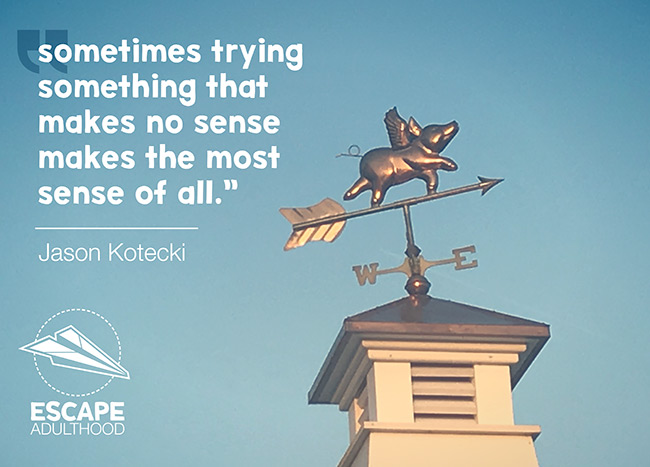
We like to pretend that we are rational creatures. That’s cute.
In his book, Predictably Irrational, behavioral economist Dan Ariely digs deep into the reasons why smart people make irrational decisions every day. It’s a fascinating read, and proof that we are not as logical as we think we are.
Logic is the default mode of Adulthood. We pride ourselves on being rational and realistic.
Children, however, do not shy away from the illogical, irrational, and (seemingly) unrealistic.
The reason I think we grown-ups should be more like kids goes beyond making our lives more fun (although that’s a great by-product). It’s because it can help us solve big problems and achieve our most important goals.
Another book that has gotten me fired up about this recently comes from advertising legend Rory Sutherland. In Alchemy: The Dark Art and Curious Science of Creating Magic in Brands, Business, and Life, Sutherland argues that logic and rational thinking are not always the best way to solve our most challenging problems. He suggests that we are “psycho-logical” as well, which helps explain why we do so many thing that don’t make “sense.”
For example, as I have written about previously, there is no logical connection to be made between the quality of a restaurant’s food and the fact that it features goats grazing on a grass-covered roof. And yet, Al Johnson’s restaurant is regularly one of the busiest eateries in Door County, Wisconsin.
I recently spoke at a staff meeting for a state university. They, like other similar institutions, are struggling with the changing landscape of education, fighting to counteract falling enrollment numbers. The question is an important one in the context of their survival: how do we convince students to choose our school over all the other choices, and once they do, how do we get them to stay enrolled through graduation?
I have four ideas that I think are pretty solid.
1) Offer free coffee anywhere on campus to every student with a valid Student ID. And not just regular black coffee, but espresso, lattes, and blended ones as well. Generate buzz as the school that provides a caffeine buzz for their students.
2) Make a policy that any student who graduates with a certain GPA is guaranteed job placement or their money back. Tuition, room and board, everything. From what I remember, this school has a 93% placement rate as it stands, so you’re mostly just re-framing reality with an attention-getting and emotion-laden promise.
3) Give each student who graduates with a certain GPA a $5,000 travel voucher to use as they wish upon graduation. There is a company near Madison that offers a four-week paid sabbatical – including travel – to any employee who completes five years of service with the organization. I don’t see why a university couldn’t do the same, especially considering how enriching and educational travel can be.
4) Turn the graduation ceremony into an epic can’t-miss event. Hire an A-list band and have a top-secret concert, with tickets available only to graduates and four people of their choice. Imagine Coldplay jamming in the background as the new graduates walk across the stage to get their diplomas!
A rock show?! Am I off my rocker? Or could these ideas actually work? They sure don’t seem all that logical. It would certainly be difficult to convince an Adultitis-ridden board to sign off on any of them.
And of course, they all cost money. But money is already being spent to increase awareness, recruitment, and engagement in a number of logical ways…how is that working? By all measures, this institution is near the top of the list when it comes to educational excellence. Shouldn’t that be enough to attract more than enough students to campus?
Yes, unless you realize that logic is not how we make decisions, it’s how we rationalize them.
Once you’ve spent a hundred thousand dollars on a four-year degree, does a free concert, all-you-can-drink espressos, or a measly $5,000 travel voucher even the score? Of course not. It makes no sense.
In the same way it makes no sense for a liberal arts major to choose a school based on how well an athletic team can shoot a ball into a hoop, and yet colleges receive more applications when their basketball teams do well.
The ideas I’ve suggested above may not make sense in a logical way, but they do appeal to the human desire for status, exclusivity, belonging, validation, and our penchant for noticing and remarking about differences.
Alas, I realize that you are probably not concerned about how to get more students to attend your local college. But I bet you do have a nagging challenge you’ve been struggling to solve, whether it’s in your local community, at work, or with one of your children. I’m also guessing that you’ve exhausted the logical solutions.
If it could already have been solved by logic, it would have been.
Adultitis will get all hot and bothered about your attempt (or even your suggestion) to try something that can’t be supported by logic.
But if the logical approach isn’t working, what do you have to lose?
Considering we’re dealing with human beings here, sometimes trying something that makes no sense makes the most sense of all.